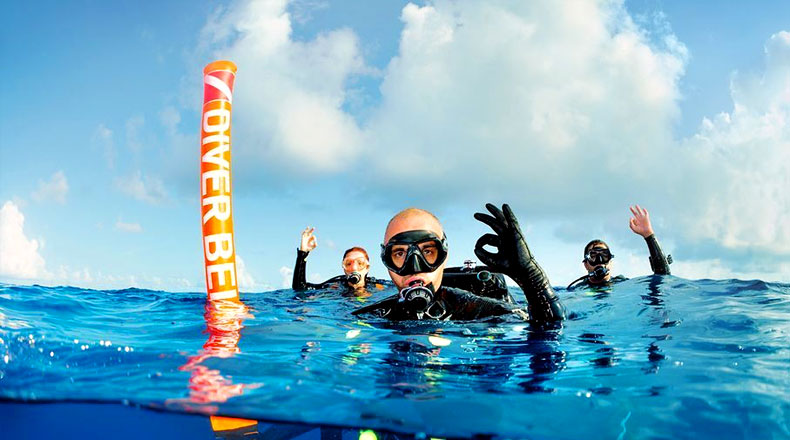Surface Signaling Devices For Scuba Divers

Imagine, you are diving on a beautiful coral reef, schools of colorful fish glide beside you. Out of the corner of your eye, you spot a big green sea turtle and start following it from a distance. A few short minutes later you realize that you got distracted and swam off-course. Surfacing from the dive, you find that the boat is far off in the distance and there is no way you can swim to it. You wave your hands in the air to no avail; you try to scream but the whistling wind drowns out your voice. If you want to get noticed, you’re clearly going to need some help.
While a situation like this does not happen often, you need to be prepared. Safety equipment and signaling devices, in particular, should be with you on every dive. They will help you be seen and heard if you need assistance.
Surface signaling devices (SSDs) can be categorized into four types: visual, audible, electronic, and night-use. Depending on surface conditions, each type brings its own advantages, so it is best if you carry at least two different types of signaling devices. Most are quite small and can fit neatly into a BC pocket or clip comfortably to a D-ring.
Visual Surface Signaling Devices
Inflatable Signal Tubes. These brightly colored inflatable tubes - usually red, orange or yellow - stand tall above the water to make you more visible to surface traffic. An average-size signal tube is effective in attracting attention up to about a half mile, while longer tubes can commonly be seen from three-quarters of a mile and sometimes up to a full mile, depending on the time of day, and the surface conditions. When not in use, the tube can be rolled up compactly. In many areas worldwide, signal tubes are required equipment.
Delayed Surface Marker Buoys. Similar to inflatable signal tubes, DSMBs are attached to a line and reel and can be deployed from underwater or at the surface.
Signal Mirrors. Mirrors are among the oldest, yet most effective signaling devices. They’re small, usually no bigger than a credit card, have no batteries or moving parts, and can attract attention from miles away. By reflecting sunlight with your mirror, you can even signal an airplane overhead. The best mirrors offer a center “sight” that lets you see the reflection as a red spot when you look through it. Put the red dot on the vessel you’re trying to signal and they should see the flash.

Audible Surface Signaling Devices
Whistles. A whistle is small, easy to carry and effective, which makes it the most common audible surface signaling device. The sound from a standard signal whistle carries up to about a quarter-mile over water. The best whistles can be heard over twice that distance. It is a standard practice to attach your whistle to your BCD inflator hose where it’s easy to find if needed.
Air Horns. These devices use air from your tank to create a piercing honk that can be heard up to a mile away. There are a variety of different styles available that usually attach to your BCD inflator hose. Keep in mind, in order to use this device, you need to have air in your tank.

Electronic Surface Signaling Devices
There are a number of new electronic signaling devices available. Some are simply GPS personal locator beams; others incorporate a VHF radio that will allow you to speak either to your dive boat or to potential rescuers, including the Coast Guard. Good electronic signaling devices can transmit an emergency signal up to 30 miles. If you decide to use one though, be sure to read the instructions carefully to know how it works and check the batteries before each dive.
Nighttime Surface Signaling Devices
Signal lights and flashes will help you gain attention after dark. It is best to choose a light that can be mounted atop a signal tube to get maximum elevation. You can also use chemical light sticks or battery-powered tank lights to enlarge your target by providing steady light that contrasts the strobe.
To conclude, here are a few general recommendations on using signaling devices:
- Always dive with at least two signaling devices - an inflatable tube and an air horn or whistle.
- Buy the longest, widest, brightest tube you can carry.
- If you feel that there is a surface current and you are drifting further away from the boat, deploy your signal tube immediately. You may be out of visible range in a matter of minutes.
- If your buddy also has a tube, both should be deployed. Multiple tubes are easier to spot than individual ones.
- Wave the tube over your head and blow your whistle until you see some sign that the boat crew has noticed you.
- When you have the boat's attention, attach the tube so that it remains vertical in the water.




